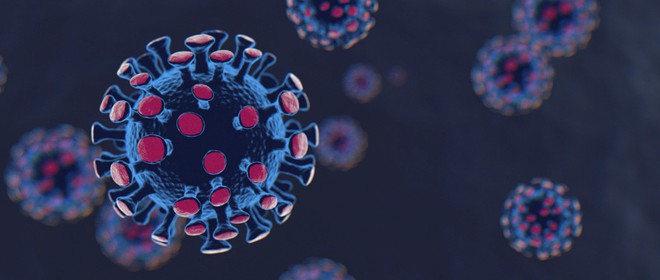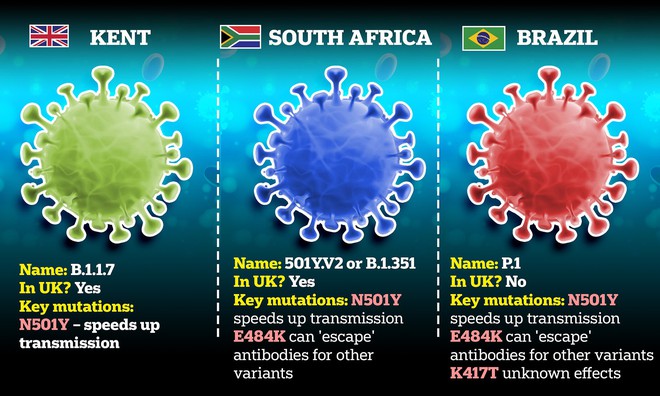The new UK variant of the SARS-CoV-2 virus continues to mutate
- Tram Ho
That worrying information has just been published in the report of the British Community Health Agency (PHE) on the night of February 2. Based on this document, scientists have discovered at least 11 modified genomic sequences of the SARS-CoV-2 virus, appearing among the viruses already transformed into the B.1.1.7 virus circulating at the city of Bristol in England.
” Preliminary information shows that the virus has mutated more than once,” the report said. During the first variant, the UK SARS-CoV-2 virus picked up a mutation denoted N501Y to become B.1.1.7. With the second variant, B.1.1.7 has accumulated the additional mutation denoted E484K.
This is the same mutation found in the SARS-CoV-2 variants in Brazil and South Africa. E484K is very dangerous, because in testing, scientists have found that the virus that carries this mutation could reduce the preventive efficacy of existing COVID-19 vaccines.
In addition, there is concern that the UK variant of the SARS-CoV-2 virus could re-infect more effectively if it adapts to human immune responses, including those with COVID-19. recovered.

Variation B.1.1.7 in the UK continues to change
If you’re still puzzled as to why viruses can mutate so quickly, here’s an answer on how they work . Mutations are inherent in evolution, and it occurs in every life cycle of a virus.
Each time the SARS-CoV-2 virus copies its 30,000-character RNA code, some errors can happen anywhere and anytime. These replication errors are mostly harmless, or even harmful to the virus itself.
But in extremely large numbers, an extremely low rate of changes in which the virus becomes stronger will inevitably occur, it is only a matter of time. And as these new virus variants become more powerful, according to the theory of evolution and natural selection, they will begin to overwhelm the old virus and become the new popular virus.
In the first variant of the SARS-CoV-2 virus in the UK, we know that the virus had N501Y mutations on the part of the RNA responsible for making its prickly protein – the outermost part that the virus uses to invade. host cell entry – in this case the human lung mucosa and respiratory tract.
These prickly proteins are also the key point our COVID-19 vaccine is targeting. The Brazilian and South African SARS-CoV-2 variant had this N501Y mutation, along with another mutation, E484K, also in the prickly protein-producing gene.

Now, it appears that a small number of UK variants are also acquiring the E484K mutation of the South African strain, but following an independent path.
“The E484K mutation has now been identified in a fraction of the virus in the UK that had a variant once before. This shows that the British variant is currently independently receptive to the change on the E484K, ” said Dr Jonathan Stoye. Explains the Head of the Laboratory of Host-Retrovirus Interaction at the Francis Crick Institute.
This is especially worrisome since E484K is believed to be the main mutation that affects the effectiveness of the vaccine. For example, a recent trial of the Novavax COVID-19 vaccine found it to be 85.6% effective on the UK variant, but only about 60% effective for the fast-spreading South African variant. .
Scientists are not surprised
It may sound surprising that the mutation can still appear on a once-mutated virus in the UK before, but the researchers said they were not surprised.
Associate Professor, Dr. Julian Tang, a clinical virologist at the University of Leicester, UK, said: ” The PHE report updated surface B.1.1.7 mentioned that this virus had an additional E484K mutation. – This is a worrying development, but not completely unexpected.
“This E484K mutant was present in South African B.1.351 / 501Y.V2 and Brazilian B.1.1.28 / P1 / P2 variants – and is now believed to be the main mutation that affects vaccine efficacy- please, “adds Dr. Tang.
“B.1.1.7’s acquisition could be due to recombination with one of the South African or Brazilian variants when they both infect inside a cell – as we see with the influenza viruses. different – but this is more rare with coronavirus.
Therefore, this is more likely to arise through natural and convergent / convergent selection / evolution in human populations, when the virus adapts to a new host – the virus can only evolve through through continuous copying “.

Another danger is that the SARS-CoV-2 virus is adapting to our immune response, professor Lawrence Young, a virologist and professor of molecular oncology at the University of Warwick. even those infected with COVID-19 and recovered from the disease.
” There is concern that the E484K mutation may impair the immune response and also affect the lifespan of the antibody neutralization reaction. Therefore, the B.1.1.7 variant carrying the E484K mutation could be re-established. infection is more effective, “ he said.
It is too early to tell how the variant of the SARS-CoV-2 variant in the UK will affect the broader outbreak in the UK as well as around the world. Against this backdrop, we still need to seriously take preventative measures such as wearing a mask, frequent hand washing with soap and keeping social distance.
Refer to BBC, Reuter, Sciencemediacentre
Source : Genk
